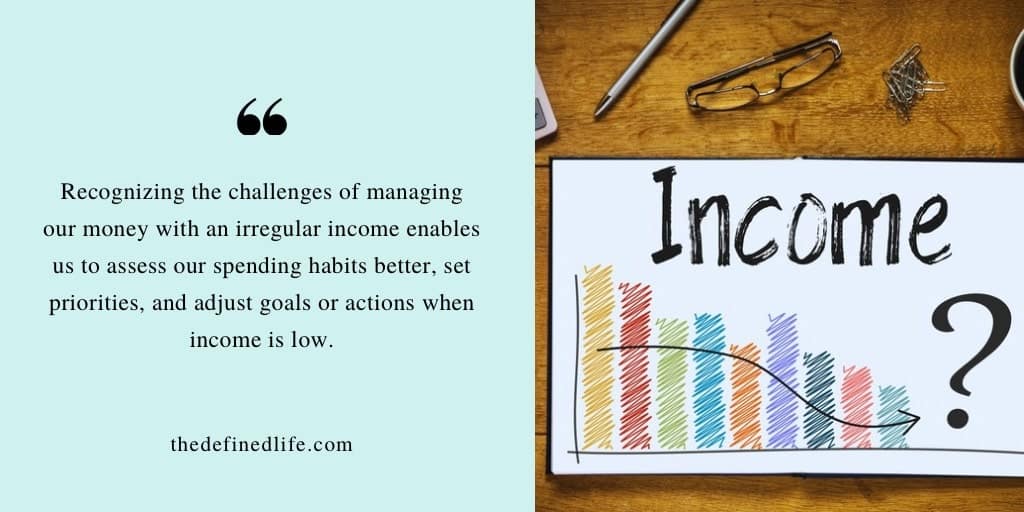
Irregular income refers to an inconsistent income. Irregular income is earned through self-employment, contract labor, commission-based work, seasonal work, or any other type of employment where pay is not received regularly. Uncertainty in income is a significant problem since it makes budgeting difficult. Budgeting for monthly costs, savings, and long-term goals is more difficult when income is inconsistent. This instability might make planning challenging and cause undue financial stress.
However, being knowledgeable and ready to manage our finances despite an irregular income will help us maintain financial stability, lessen stress, make wise decisions, and set realistic financial goals. Recognizing the challenges of managing our money with an irregular income enables us to assess our spending habits better, set priorities, and adjust goals or actions when income is low.
Table of Contents
Prioritize building an emergency plan.
Having an emergency fund is even more crucial when your income is unpredictable. Having the security of maintaining an emergency savings account to deal with the financial effect of unexpected events is priceless when you have an irregular income. Keeping an emergency fund lessens the chance of using credit cards or loans to deal with current expenses.
Plan for low-income month/s
Anticipating low-income months or periods and planning accordingly is essential to successfully manage our money with irregular income. Here are some suggestions on how to pinpoint low-income months/periods:
- Examine your income records from the past few months or years. Identify tendencies or patterns that might explain why some months have lower income than others. Keep track of any dips in income that happens frequently.
- Think about your field of work or profession. There may be seasonal or yearly shifts in demand from industries. For instance, you must keep tabs on sales and client cycles if you are self-employed. You can identify slow months or when clients are more likely to delay payments.
- Factor in the economic aspect that likely affects your income. The number of available jobs and potential earnings may shift due to economic shifts, including market conditions or industry-specific developments. Be updated with financial status and advancements in your field that could impact your revenue.

Monitoring your cash flows and factoring in your situations can help accurately assess your low-income month.
Adjusting your spending during your low-income month is non-negotiable. Cutting back on expenses is an important strategy to survive your lean months.
Diversify your income
Diversifying your income is also an effective strategy for managing your finances when you have an irregular income. Diversifying your income helps create a more stable financial foundation by reducing dependence on a single income stream. Not relying on a single income stream helps create a more reliable cash flow. Finally, it opens opportunities to earn more income by exploring different income streams and potentially increasing your overall earning potential.
How to stop relying on a single income stream?

Determine your strengths and passions. Find out what you are good at and what you are interested in. Think of possible ways of converting your passions and skills into money. You can also try honing your skills further to gain additional confidence.
With the expansion of e-commerce, launching a new business is easier than ever. Find a specific market or product that piques your interest, and see if you can start selling it or offering your services online.
You can also make and sell digital items in your specialized field. Examples include e-books, printables, online courses, and other downloadable items you can sell online. Digital products do not require big investment, but they can be a steady source of income.
Renting out a property or a spare room in your house can also be a good source of income. You can use websites like Airbnb to advertise the room or property you want to rent. Alternatively, you can rent a storage unit or a parking spot.
You can also put some money into dividend-paying equities, which can be a great source of passive income. Find and invest in reliable businesses with good track record and regular dividend payments. Despite the dangers, stock investing can be a reliable source of income for the long haul. However, do thorough research before putting your money in a risky business.
Collaborate and network with other professionals in your field to find opportunities for joint ventures and other revenue-generating partnerships. You can find potential business partners and learn new ways to make money by participating in industry events and online groups where like-minded people gather.
Diversifying your income stream may be difficult, but it is certainly possible. Just think about how confident you will feel when you are earning from your multiple sources of income. You can have a significant safety net to save you during your low-income months. And it can also be an opportunity to explore different fields where you can indulge in your interests while earning money.
Living below your means
Living a frugal lifestyle is essential since your income varies from one month to the next. Living below your means can help you navigate the fluctuations in your income and keep up with your monthly bills.
Living a frugal lifestyle means keeping a close eye on your spending. It also means that you can prioritize spending money on necessary things, constantly weighing and differentiating your wants and needs when using your money.
Living below your means allows you to allocate your money to savings, investments, and debt repayment.
Check another post to get easy tips on how to live below your means.
Practice risk mitigation strategies

This doesn’t sound very easy, but I assure you that it is not. An irregular income bears some risk- the word itself “Irregular income.” But another strategy in handling your finances when you have an inconsistent income is to pass the chance to others.
Passing the risk means lessening its effect on your finances. You can pass the risk by securing insurance- especially health insurance. Medical expenses can be stressful, especially if you do not have insurance. You can spend huge amounts of money from your savings to pay your hospital bills or medication. This can put you in financial stress and can delay you in achieving your financial goals.
Staying organized
Being organized is another important thing to remember when managing your finances with an irregular income. Being organized will help you to make wise financial decisions. A way to stay organized is by monitoring your income and expenses, budgeting, and setting clear financial goals.
To keep your finances organized, it is important to document when and how much money comes in from each income source. You should also make a budget that can be adjusted to fit your inconsistent earnings. Saving regularly to support you in times of low-income months is also necessary. Keeping a financial calendar to remind you of your bill due dates will also help you stay organized.
Always keep a wall between your personal and professional finances- we call it the Business Entity Concept in accounting. It is where the documentation and recording of the business transactions is separate from the owners’ money.
Make savings a priority by setting up recurring deposits into your account to help you save regularly. Also, remember to schedule regular reviews to assess your progress and make any required adjustments
Advantages of an irregular income earner
The previous sections of this blog post can give a vibe that having an irregular income sounds challenging and problematic. However, being an irregular income earner also have advantages. Here are reasons why I think that irregular income earners are lucky:
- The possibility to earn higher is endless for people with nonstandard work schedules compared to those with conventional salaries. Do not take it badly, I have a 9-5 job in a Bank, but that took most of my time. However, I have started side hustles, and I think that earning more, although it will take time, is also possible with my side hustles.
- Irregular income earners have greater freedom and flexibility in setting work hours and planning. They have more autonomy over their schedules and can devote more time to other pursuits if they want.
- Budgeting, financial planning, and self-discipline are just a few skills that can help you manage an inconsistent income. These abilities can be helpful in many areas of life, including financial management and career advancement. Earners of irregular income tend to develop a wide range of skills that can help them in many situations.
- Persons with irregular income are more prone to try their hands at starting their businesses. Accomplishing these goals can lead to the personal and professional fulfillment that comes from creating one’s path in life.
- Another reason I think such people are lucky is because the financial uncertainty brought about by inconsistent income can help them develop adaptability and resilience. They will develop skills such as budgeting, diversifying income, and dealing with unpredictability. This flexibility will help in dealing with our lives ups and downs too.

Final thoughts on how to manage your finances with irregular income.
Managing finances with irregular income can be overwhelming. But there are ways to make it work. I hope this blog post gives you some answers and helps in helping you succeed in your finances.







Leave a Reply